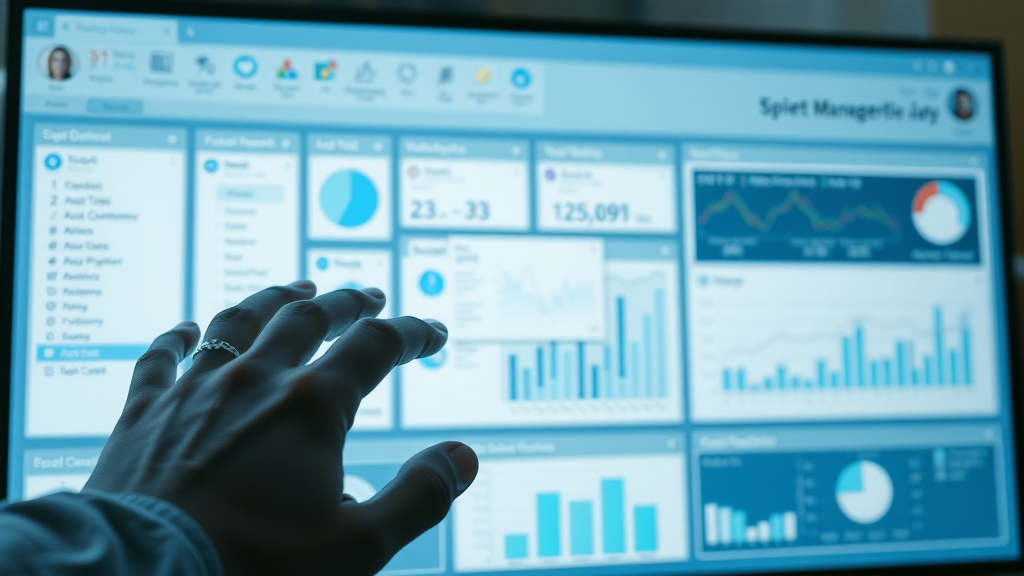Imagine boosting your agency's revenue while working fewer hours—and letting data-powered automation tools handle the grunt work. Statistics reveal that agencies using agency automation see not just more time saved, but a measurable impact on their bottom line. Ready to find out how to work smarter, not harder , and leave repetitive tasks behind? Dive into the exact automation toolkit I use to run my agency on autopilot—with key strategies that any modern marketing agency can implement for exponential growth.
Did You Know? Over 75% of Agencies Use Agency Automation to Save Time and Boost Revenue
In today's fast-paced digital landscape, more than three-quarters of marketing agencies have adopted some form of agency automation to streamline operations and maximize profitability. Marketing automation tools are now critical for lead gen , campaign management, and reporting, enabling you to accomplish more in less time. The main keyword, agency automation , is now synonymous with efficiency, letting even small businesses compete with industry giants. For example, our team slashed manual processes by integrating smart automation tools —increasing conversion rates without adding extra hours. Imagine generating and nurturing leads while you sleep, or analyzing campaign performance with a click. That’s the power of automation in action for digital agencies and small business owners alike.

Unlocking the Power of Agency Automation for Modern Marketing Agencies
Definition and Impact of Agency Automation
Agency automation refers to the deployment of digital tools and platforms that handle repetitive, routine, or rule-based marketing tasks without manual intervention. Whether through marketing automation systems, project management dashboards, or AI-driven analytics, automation improves workflow, accuracy, and consistency for marketing agencies of all sizes. The impact? Teams can shift their focus to creative strategy, innovation, and growth, knowing that the backbone tasks—like client reporting or lead gen follow-ups—are running smoothly. When implemented correctly, agency automation boosts productivity, reduces costly errors, and keeps both clients and teams satisfied.
One of the game-changers for our agency was switching to fully integrated automation tools that connect email marketing , social media management, and data reporting. Instead of manually pulling analytics, our reporting tools auto-generate actionable insights and deliver them right to our inbox. This not only saves valuable time but also ensures we never miss a beat in optimizing our campaigns for peak performance.
The ultimate strength of agency automation is scalability—a necessity for agencies looking to take on more clients without overloading their teams. By reducing manual intervention and automating routine processes, agencies remain agile and efficient, freeing creative talent to work on growth-driving initiatives while repetitive tasks are handled in the background.
Save time by automating lead generation and client communications
Boost accuracy and minimize manual errors in campaign reporting
Enable teams to focus on high-value, creative strategies
Streamline repetitive tasks across marketing agency departments
Scale operations effortlessly as your agency grows
"Agency automation allows businesses to scale rapidly and focus on growth instead of repetitive tasks."
Why Your Marketing Agency Needs Automation Tools
Major Pain Points Solved by Marketing Automation
Traditional marketing agency workflows are riddled with challenges: manual data entry, time-consuming reporting, inconsistent lead nurturing, and fragmented campaign oversight. These pain points not only drain time but also limit your agency’s capacity to scale and keep clients happy. With agency automation , the majority of these issues disappear. Platforms connect disparate tools like Google Ads, email marketing , and customer relationship management, transforming disconnected marketing tasks into a seamless workflow. The result is fewer dropped leads, faster response times, and better focus on sales funnel optimization.
For instance, my agency once struggled to keep up with manual lead gen and follow-ups. After implementing an all-in-one automation solution , our pipeline became instantly more organized—prospects were engaged automatically, and clients received timely updates without our team lifting a finger. This shift alone freed hours each week to focus on refining campaigns and delivering better client outcomes.
Another pain point solved is the high error rate in manual campaign reporting. Marketing automation platforms ensure that reports are generated accurately, allowing agencies to provide clear, actionable insights and deliver transparent value to clients at every turn.
Client onboarding workflows get automated from start to finish
Follow-up emails and nurture sequences sent without delay
Content scheduling for social media made easy
Reporting tools pull real-time data instead of manual compilation
Routine campaign checks and optimizations handled automatically
Agency Automation vs. Traditional Operations
The contrast between a traditional and an automated marketing agency couldn’t be clearer. In a manual environment, every project kick-off, email blast, and social post requires individual attention, leading to bottlenecks and burnouts. By comparison, agency automation leverages automation tools like project boards, workflow automation, and automated customer responses, dramatically reducing time and error. You move from surviving the daily grind to consistently over-delivering for clients—without added headcount.
For example, we used to spend hours every week simply consolidating project updates and emailing stakeholders. Introducing a project management automation tool eliminated these redundant steps, turning what was once a source of team stress into an invisible, error-free process. Today, clients and team members receive real-time updates, deliverables move forward without bottlenecks, and our agency operates with a newfound efficiency.
Plus, the adaptability of automated agencies is unmatched. By configuring tools to align with changing client needs or business growth, agencies can remain flexible, competitive, and profitable in the rapidly evolving landscape of digital marketing.
Agency Automation vs. Manual Processes |
Time Saved |
Error Reduction |
Cost Efficiency |
Scalability |
|---|---|---|---|---|
Automated |
Up to 40% |
Significant |
High |
Seamless |
Manual |
Minimal |
Low |
Poor |
Limited |

Core Automation Tools Every Agency Must Have
The Best Automation Tools for Project Management
Effective project management underpins every successful agency. With the right automation tools , your team can automatically assign tasks, set deadlines, track progress, and centralize communication—all from one dashboard. Platforms like Asana, Trello, and Monday.com provide templates for workflows that fit any marketing agency structure, allowing seamless collaboration and instant project status updates. In my own agency, integrating such a tool reduced time spent on status meetings, keeping our team aligned and focused on delivering results, not chasing updates.
A great automation solution for project management is defined by its ability to automate task creation based on triggers (like new client sign-ups), provide centralized file storage, sync with email and calendar systems, and support visual reporting of project progress. These features ultimately enhance communication with both internal teams and clients while reducing confusion and rework.
Implementing advanced project management automation positions your marketing agency to handle more simultaneous campaigns, limit project scope creep, and ensure nothing falls through the cracks. The right platform becomes your unseen assistant—quietly making sure every detail is tracked, deadlines are met, and clients are kept in the loop.
Automated task assignment upon lead intake or campaign start
Centralized communication to eliminate information silos
Real-time reporting and visual progress tracking
Integrated file management for swift document sharing
Easy scalability as agency client load increases
Social Media Automation: Tools for Social Media Management
Managing multiple social channels at scale can be overwhelming. That’s where dedicated social media management and automation tools come in. Platforms like Buffer, Hootsuite, and Sprout Social allow you to schedule posts, automate publishing, and monitor engagement from a single interface. Automation also helps standardize brand voice and ensure consistent communication across platforms, vital for any agency overseeing multiple brands.
Smart scheduling and cross-channel analytics mean you can optimize posting times for higher engagement and track which campaigns perform best. Automated listening features allow for real-time alerts on brand mentions, letting your team respond or pivot strategies quickly. Instead of manually posting every message, now you can plan and automate an entire month of content in one afternoon, freeing up creative energy for campaign strategy.
Another key area is media management : automation helps catalog images, videos, and digital assets, ensuring teams access the right files at the right time. This centralization speeds up content creation and ensures cohesive branding across all client campaigns.
Automated content scheduling and cross-platform posting
Engagement and analytics dashboards for actionable insights
Real-time brand monitoring and quick response features
Streamlined media storage and access for quick content creation
Performance reporting to continuously refine strategy
Effective Email Marketing Automation Tools
Email remains a cornerstone of digital marketing, but scaling it is impossible without the right email marketing automation tool . Solutions like Mailchimp, ActiveCampaign, and HubSpot automate everything from welcome sequences to lead nurturing and sales funnel management. These tools let you segment audiences, personalize messages at scale, and set up trigger-based workflows that move prospects through the buyer’s journey without manual follow-up.
Best practices in email marketing automation include segmenting lists by customer behaviors, automating responses to new sign-ups, and tracking open/click rates to optimize messaging. By studying these metrics, agencies can refine campaigns for better engagement and higher conversion. Our agency uses these best practices—coupled with tailored automation—to ensure our emails reach the right people at the right time, nurturing leads to clients with minimal hands-on effort.
Robust email automation also enables fast A/B testing, integration with CRM platforms, and advanced analytics, providing a complete toolkit for nurturing every prospect. The result is a more predictable, effective, and scalable lead generation system for agencies of all sizes.
Automated welcome sequences and nurture campaigns
Personalized content for each buyer segment
Trigger-based follow-up and retargeting emails
A/B testing to refine subject lines and offers
Comprehensive analytics for continuous improvement

Automation Tools for Lead Generation & Lead Nurturing
Lead generation is the lifeblood of every marketing agency —and no other area benefits more from automation than lead gen and nurturing. The leading automation tools for this are CRM platforms like Salesforce, automated chatbots for web capture, and funnel management systems that qualify and deliver leads to your team. These tools automate everything from capturing visitor details to following up with warm leads, ensuring no opportunity slips through the cracks.
Leveraging agency automation services for lead generation allows you to create predictable pipelines and nurture leads with multi-channel touches—whether by email, SMS, or retargeting ads. Automated scoring also tells your team which prospects are hottest, so your salespeople can prioritize high-value targets. In my own agency, incorporating lead gen automations led to a doubling of high-quality opportunities in just months.
With an automated lead nurturing system, prospects receive tailored content at every stage, building trust and moving faster toward a decision. This not only increases conversion rates but also improves the client experience, since communication is timely, relevant, and always delivers value.
Automated lead capture forms and chatbot engagement
Lead scoring and segmentation for efficient targeting
Multi-channel nurturing: Email, SMS, retargeting ads
Automatic follow-up sequences to keep deals moving
Pipeline analytics for actionable lead gen insights
Walkthrough: My Favorite Agency Automation Tool in Action
Implementing Agency Automation: The Step-by-Step Approach
How to Select Automation Solutions that Fit Your Marketing Agency
Choosing the right automation solution starts with a clear assessment of your agency’s workflows. Map out daily, weekly, and monthly marketing tasks —identifying areas with high volumes of repetitive work, such as content distribution, campaign reporting, or lead qualification. Focus on tools that integrate easily with your current systems and are scalable, so you aren’t limited as your agency grows. From our agency’s experience, opting for platforms with open APIs and active support communities enables smoother onboarding and long-term flexibility.
Consider the level of automation needed: do you want simple task triggers, or deeper integrations that cross platforms (like syncing Google Ads, CRM, and reporting tools)? Evaluate trial periods, conduct pilot tests, and seek input from team members who’ll be impacted by these changes. Remember, the best tool is the one that supports your unique workflows without adding unnecessary complexity.
Finally, automation adoption should come with a focus on training: empower your team with onboarding resources so that transitions are smooth and resistance is minimized. Clear communication about the goals and benefits of agency automation is key to team buy-in and overall ROI.
Audit current marketing and sales processes
Identify bottlenecks and repetitive tasks ripe for automation
Assess compatibility with core tools (email, CRM, reporting)
Evaluate cost, scalability, and support resources
Plan comprehensive staff onboarding and training

Integration with Existing Marketing Agency Workflows
Smooth integration is the linchpin of any successful agency automation project. Once you've selected your automation tools, focus on how they’ll mesh with your established processes. Connect your automation platform with email, calendar, CRM, and analytics tools, then design logical workflows that align with real-world needs. Use automation to enhance—not disrupt—critical agency operations, so team members experience productivity gains, not confusion.
A common obstacle is fragmentation: when disparate systems don’t communicate, creating data silos and process gaps. Invest in tools with robust API support and pre-built integrations, which facilitate data syncing and eliminate repetitive manual entry. My agency overcame initial adoption resistance by forming a “power user group” and piloting key automations on low-risk projects; the result was enthusiastic buy-in when the rest of the team saw real-world benefits.
Integration can also mean automating client communication: sending updates, reporting campaign progress, and even handling invoicing through seamless software connections. The less time spent on routine admin, the more time your agency can dedicate to results-focused work.
Set up automations to work in parallel with routine workflows
Address resistance by piloting and iterating with feedback
Eliminate data silos by automating data transfer between tools
Automate client updates, reporting, and billing
Continuously monitor and optimize integrations
Real-World Automation Agency Case Studies
Practical examples are the best proof that agency automation delivers real ROI. In one case study, a boutique digital agency implemented an all-in-one marketing automation tool, resulting in a 50% reduction in time spent on reporting and an impressive surge in lead conversion rates. Automated lead nurturing ensured timely follow-up and a frictionless client experience, leading to increased referrals.
Another agency focused on social media management shifted to a robust automation service, centralizing content scheduling, approval workflows, and analytics. The team saved 10+ hours weekly, achieving better campaign performance and freeing creative staff to craft high-impact content instead of managing tedious admin. These cases highlight the value of moving repetitive, error-prone tasks to digital platforms.
Working with an automation agency or deploying agency-level solutions can fundamentally transform how you approach lead generation , onboarding, and campaign optimization. Whether you’re a solo consultant or a full-service agency, automation lets you quickly scale operations and achieve measurable growth.
Automating social media scheduling for consistent online presence
Leveraging chatbots and forms for round-the-clock lead gen
Centralized analytics driving actionable campaign improvements
Automatic project updates keeping clients in the loop
Massive time-savings reinvested into business growth
Behind-the-Scenes: Setting Up an Automation Tool for Social Media Management
Measuring ROI and Performance with Agency Automation
Key Metrics and KPIs: Save Time, Grow Revenue
Success with marketing automation depends on tracking the right metrics. The most impactful KPIs include time saved, increases in qualified leads, conversion rates, cost per lead, and overall campaign performance. Use analytics dashboards to pinpoint bottlenecks and monitor improvements as automations mature. My agency routinely reviews these numbers after every automation rollout, using real-world data to justify future investments in technology.
Automation’s biggest advantage is measurable improvement: routine workflows get faster, results become predictable, and revenue growth follows. For example, after implementing lead gen and project management automation tools, we saw a 30% uptick in new opportunities with the same headcount. These KPIs drive accountability and reinforce ongoing optimization across the agency.
Other key metrics include email open rates, click-through rates, and engagement levels on automated social content. These provide a clear picture of client benefits and agency effectiveness—reporting that not only meets but exceeds client expectations.
Time spent per project drops as automation scales
Cost per lead falls with streamlined nurturing workflows
Reporting accuracy improves, with actionable insights at a glance
Client retention increases thanks to efficient communication
Campaign success rates drive up overall ROI
Before and After Agency Automation Implementation |
Revenue |
Cost per Lead |
Time per Task |
|---|---|---|---|
Before Automation |
$10,000/month |
$120 |
2 hours |
After Automation |
$16,000/month |
$75 |
45 minutes |

Scaling Your Marketing Agency with Robust Automation Services
The most successful agencies don’t just use automation—they make it the core of their growth strategy. By mapping out a roadmap to full automation, you ensure that organizational knowledge, workflows, and institutional processes are codified and scalable. This means onboarding new team members (or clients) is easy, taking on larger projects becomes manageable, and every process can be tracked, measured, and improved.
Becoming a fully automated marketing agency involves a phased approach: start with the most time-consuming, repetitive tasks (like lead gen or reporting), then expand automation to sales, onboarding, campaign execution, and client updates. Over time, the agency transitions from reactive to proactive—able to spot and capitalize on trends thanks to real-time data and seamless collaboration.
With automation deeply integrated, your agency becomes more profitable, your team more agile, and your clients happier. Automation services future-proof your business against the next industry shift by ensuring you’re ready for whatever comes next in digital marketing.
Begin by automating simple, repetitive admin work
Expand into client-facing automations (like lead nurturing)
Codify best practices for onboarding and workflow creation
Implement continuous analytics and improvement cycles
Embrace AI and machine learning for advanced automation opportunities
"True marketing automation means being able to focus 100% on strategy while the tools handle the rest."
Client Success Story: Doubling Leads with Agency Automation
Frequently Asked Questions About Agency Automation
What is agency automation?
Agency automation is the practice of using digital automation tools and software to handle repetitive, time-consuming marketing tasks within a marketing agency. By automating activities such as project management, lead generation, client communications, and reporting, agencies can save time, reduce errors, and scale services effortlessly. This approach lets your talent focus on creative strategy and client results, not routine admin.
What are the 4 types of automation?
The four main types of automation used in marketing agencies are: (1) Task automation, which handles routine actions like scheduling and reminders; (2) Workflow automation, streamlining multi-step processes like client onboarding; (3) Process automation, which automates interconnected tasks across tools (like data syncing between email and CRM); and (4) Intelligent or AI-driven automation, where machine learning systems enhance campaign optimization, targeting, and predictive analytics.
What is automation in the hiring process?
Automation in hiring uses digital tools (like applicant tracking systems and AI-driven screening) to streamline the recruitment process. This includes automatic posting to job boards, resume screening, interview scheduling, and candidate communications. For marketing agencies, automating recruitment workflows means finding top talent faster, reducing manual effort, and ensuring a consistent, unbiased hiring process.

What is automation in real estate?
Automation in real estate means using digital tools to streamline property listing, client communication, document management, and transaction processing. Agencies can automate follow-up emails, appointment scheduling, and lead nurturing—just as in digital marketing—helping agents work efficiently and deliver a better client experience while closing deals faster.
Essential Insights for Marketing Agencies Looking to Save Time with Agency Automation
Prioritize automation for high-volume, repetitive tasks —like lead capture, onboarding, and reporting
Choose automation solutions that integrate with your existing stack for a seamless agency workflow
Measure key metrics—time saved, cost per lead, campaign performance—to refine automations over time
Begin small, then scale up as your agency grows and needs evolve
Commit to continuous training and optimization for long-term results
Next Steps: Experience Agency Automation for Your Own Marketing Agency
Ready to see what agency automation can do for your team, your clients, and your revenue? The path is clear: it’s time to transition from manual grind to automated efficiency. With the right strategy and supporting technology, your marketing agency can thrive on autopilot—giving you the bandwidth to innovate, scale, and consistently deliver client success.
Ready to grow your business? Book your free marketing strategy session with our team today.
Summary of Critical Agency Automation Benefits
Automate Repetitive Tasks and Save Time
Streamline Lead Generation and Lead Nurturing
Boost ROI with Marketing Automation Tools
Want More on Agency Automation? Get Our Free Strategy Guide
Unlock actionable strategies and tool recommendations. Download our comprehensive agency automation strategy guide for free and take your marketing agency to the next level!
To further enhance your understanding of agency automation and its benefits, consider exploring the following resources:
“Marketing Automation for Agencies: Top Tools for Scaling” ( seoptimer.com )
This article provides an in-depth look at various tasks that marketing agencies can automate, such as content creation, lead management, and campaign optimization. It also reviews top automation tools tailored for agencies, offering insights into their features and pricing.
“15 Essential Processes Every Marketing Agency Should Automate” ( vendasta.com )
This guide outlines key processes within a marketing agency that can benefit from automation, including client onboarding, email marketing, and reporting. It emphasizes how automating these tasks can lead to increased efficiency, scalability, and improved client satisfaction.
By delving into these resources, you’ll gain practical insights and strategies to implement automation effectively within your agency, paving the way for streamlined operations and sustainable growth.
 Add Row
Add Row  Add
Add 



Write A Comment